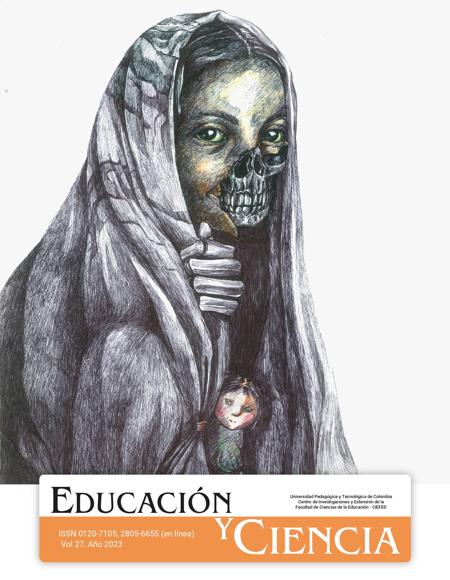Community of Inquiry, an experience for strengthen the critical, careful and creative thinking

Abstract
In this article are presented the results about the experience of forming a community of enquiry interested in developing the dimensions of critical, careful, and creative thinking in the Line of Deepening Thought and Literature made up of students from 6th grade (Tribu) to 11th grade (Samadhi) of the Fundación Pedagógica Rayuela Tunja in 2021. The experience responds to reflect on the pedagogical practice by boosting, re-signifying the voice and style of creative writers to strengthen their capacity for thought and expression focused on 18 students. The research is qualitative in nature; the data collection instruments include: audios, videos, documents, as well as evidence of discussion plans and student productions. The results describe exercises in writing, reading and discussion plans, which allow us to analyse the processes developed based on the category of multidimensional thinking proposed by Matthew Lipman. It is concluded that it is necessary to make the classroom or virtual scenarios a permanent enquiry, which allows an event of reading, writing and dialogue experiences, which allow claiming the right to think and propose from the difference.
Keywords
community of enquiry, multidimensional thinking, critical, caring and creative dimension, reading, writing, experience
References
- Aponte, E. y Aponte L. Plan educativo institucional PEI (2020) Fundación Pedagógica Rayuela. Tunja.
- Bonilla-Castro, E., y Rodríguez, P. (1997). La investigación en ciencias sociales. Más allá del dilema de los métodos. Ediciones Uniandes. Colombia, 51-66.
- Dewey, J. (2003). Experiencia y educación. Heredia: Universidad Nacional de Costa Rica.
- Jara, O. (2012). Orientaciones teórico-prácticas para la sistematización de experiencias. Biblioteca Electrónica Sobre Sistematización de Experiencias: Www.Cepalforja. Org/Sistematización.
- Kohan, W. (2009). Infancia y Filosofía. Progreso.
- Kohan, W., y Waksman, V. (2005). Filosofía con Niños: aportes para el trabajo en clase. Edición Noveduc.
- Larrosa, J. (2001). Dar la palabra. Notas para una dialógica de la transmisión, en La Liberación de la Libertad (y otros textos). Revista Latinoamericana de Estudios Avanzados, RELEA, 5(1),76-82. https://dialnet.unirioja.es/servlet/libro?codigo=574221
- Larrosa, J. (2003). La experiencia de la lectura: estudios sobre literatura y formación. Fondo de cultura económica.
- Lipman, M. (1998). Pensamiento complejo y educación. De la Torre.
- Lipman, M. (2016). El lugar del pensamiento en la educación. Octaedro.
- Lipman, M., Sharp, A., y Oscanyan, F. (1992). La filosofía en el aula (1 ed.). De La Torre.
- Pineda, D. (1992). Filosofía para niños: un acercamiento. Universitas Philosophica, 10(19). Recuperado a partir de https://revistas.javeriana.edu.co/index.php/vniphilosophica/article/view/11779
- Pineda, D. (2004). Filosofía para niños. El ABC. Beta.
- Trombadori, D. (2010). Conversaciones con Foucault. Amorrortu.
- Suárez, M. y Pulido, Ó. (2021). (Coord.) Diagramas y Polifonías. Experiencias de pensamiento. Editorial UPTC.
